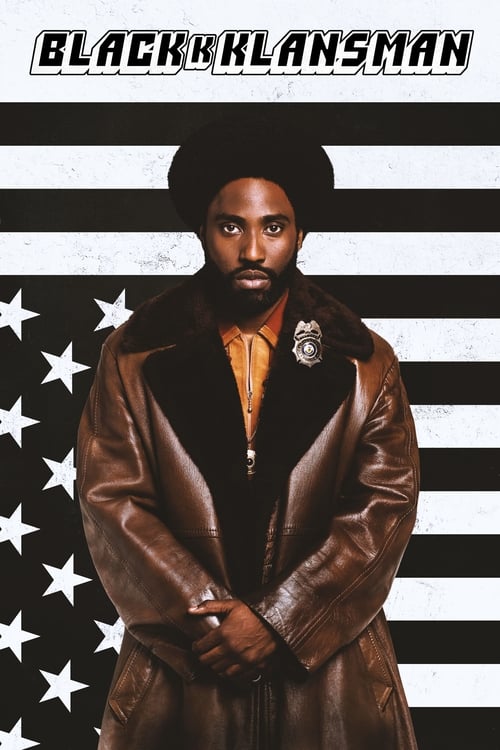BlacKkKlansman – Film Review
Published June 11, 2023

Ron Stallworth is the first African-American detective to serve in the Colorado Springs Police Department. Determined to make a name for himself, Stallworth bravely sets out on a dangerous mission: infiltrate and expose the Ku Klux Klan. The detective soon recruits a more seasoned colleague, Flip Zimmerman, into the undercover investigation of a lifetime. Together, they team up to take down the extremist hate group as the organization aims to sanitize its rhetoric to appeal to the mainstream.
Spike Lee‘s BlacKkKlansman is a thought-provoking and powerful film that skillfully combines history, social commentary, and a gripping narrative. Set in the 1970s, the movie tells the true story of Ron Stallworth (played by John David Washington), the first African-American detective to serve in the Colorado Springs Police Department. With the assistance of his colleague Flip Zimmerman (played by Adam Driver), Stallworth embarks on a dangerous undercover mission to infiltrate the Ku Klux Klan.
One of the film’s greatest strengths is its ability to address weighty subjects with a perfect blend of seriousness and humor. Lee’s directorial finesse is evident throughout, as he expertly navigates the tonal shifts from light-hearted moments to intense and unsettling scenes. The screenplay, co-written by Lee, Charlie Wachtel, David Rabinowitz, and Kevin Willmott, adeptly balances the dramatic tension of the investigation with moments of comic relief. This delicate equilibrium not only keeps the audience engaged but also serves as a poignant reminder of the absurdity and irrationality of racism.
The performances in BlacKkKlansman are exceptional across the board. John David Washington shines in the lead role, capturing Stallworth’s determination, intelligence, and the internal conflict he faces as a black man working in a predominantly white police force. Washington’s portrayal is both charismatic and nuanced, allowing the audience to empathize with Stallworth’s struggles and root for his success.
Adam Driver’s portrayal of Flip Zimmerman is equally commendable. As a Jewish officer who must pose as Stallworth in face-to-face interactions with the Klan members, Driver effectively conveys the character’s growing unease and moral ambiguity. His chemistry with Washington is palpable, and their dynamic adds depth to the film’s exploration of racial identity and the complexities of undercover work.
The supporting cast members also deliver strong performances. Laura Harrier, as Patrice Dumas, the president of the black student union, brings an air of defiance and determination to her character, serving as a potent voice against racism and oppression. Corey Hawkins gives a memorable performance as Kwame Ture (previously known as Stokely Carmichael), a charismatic civil rights activist who delivers a fiery speech that resonates long after the credits roll.
Visually, BlacKkKlansman is a treat for the eyes. Cinematographer Chayse Irvin masterfully captures the essence of the 1970s with vibrant colors and meticulous attention to detail. The film’s visual style effectively transports viewers back in time, immersing them in the era’s racial tensions and political climate.
Lee’s directorial choices also contribute to the film’s impact. The use of split-screen sequences is a particularly noteworthy technique that amplifies the film’s intensity and tension. By juxtaposing scenes of the Klan’s hate-filled rhetoric with the camaraderie and resilience of the black community, Lee drives home the stark contrast between love and hate, unity and division.
Furthermore, BlacKkKlansman excels in its ability to draw parallels between the historical events of the 1970s and the present day. Through a powerful montage that seamlessly transitions from the film’s narrative to real-life footage of the Charlottesville riots in 2017, Lee reminds the audience that the fight against racism is far from over. This connection between the past and present is a sobering reminder of the continued relevance and urgency of the film’s themes.
While BlacKkKlansman is undeniably a captivating and socially significant film, it does have a few minor flaws. At times, the pacing feels slightly uneven, with certain scenes lingering longer than necessary. However, these moments of sluggishness are quickly overshadowed by the film’s overall impact and the strength of its message.
Spike Lee’s BlacKkKlansman is an exceptional film that expertly blends history, social commentary, and an engaging narrative. With powerful performances, stunning visuals, and a thought-provoking script, the movie shines a spotlight on the ongoing struggle against racism and serves as a powerful reminder of the need for unity and activism. By deftly navigating the delicate balance between humor and gravity, Lee creates a film that entertains, educates, and challenges its audience. BlacKkKlansman is a must-see film that will leave a lasting impression and spark important conversations about race, identity, and the fight for justice.
